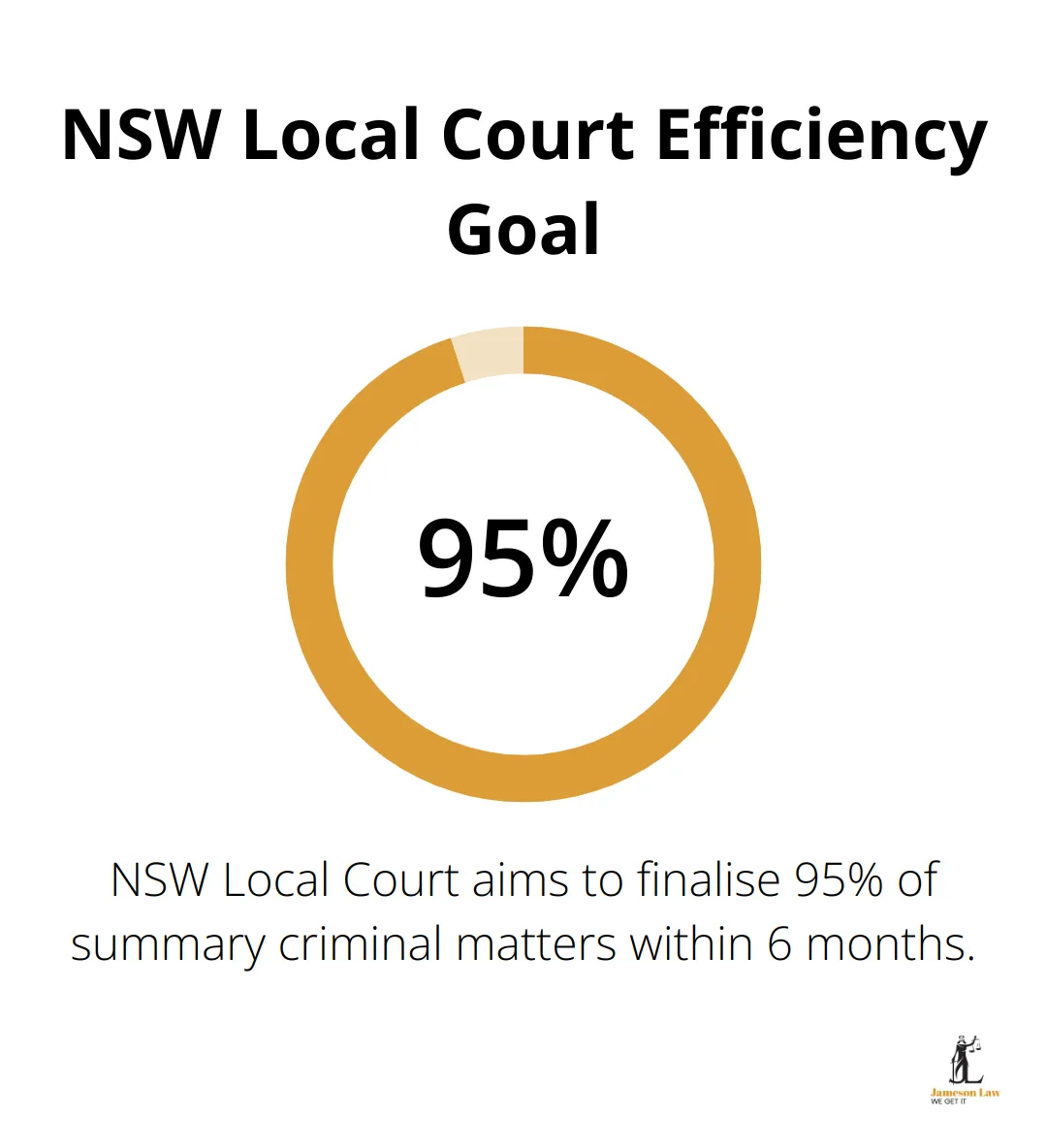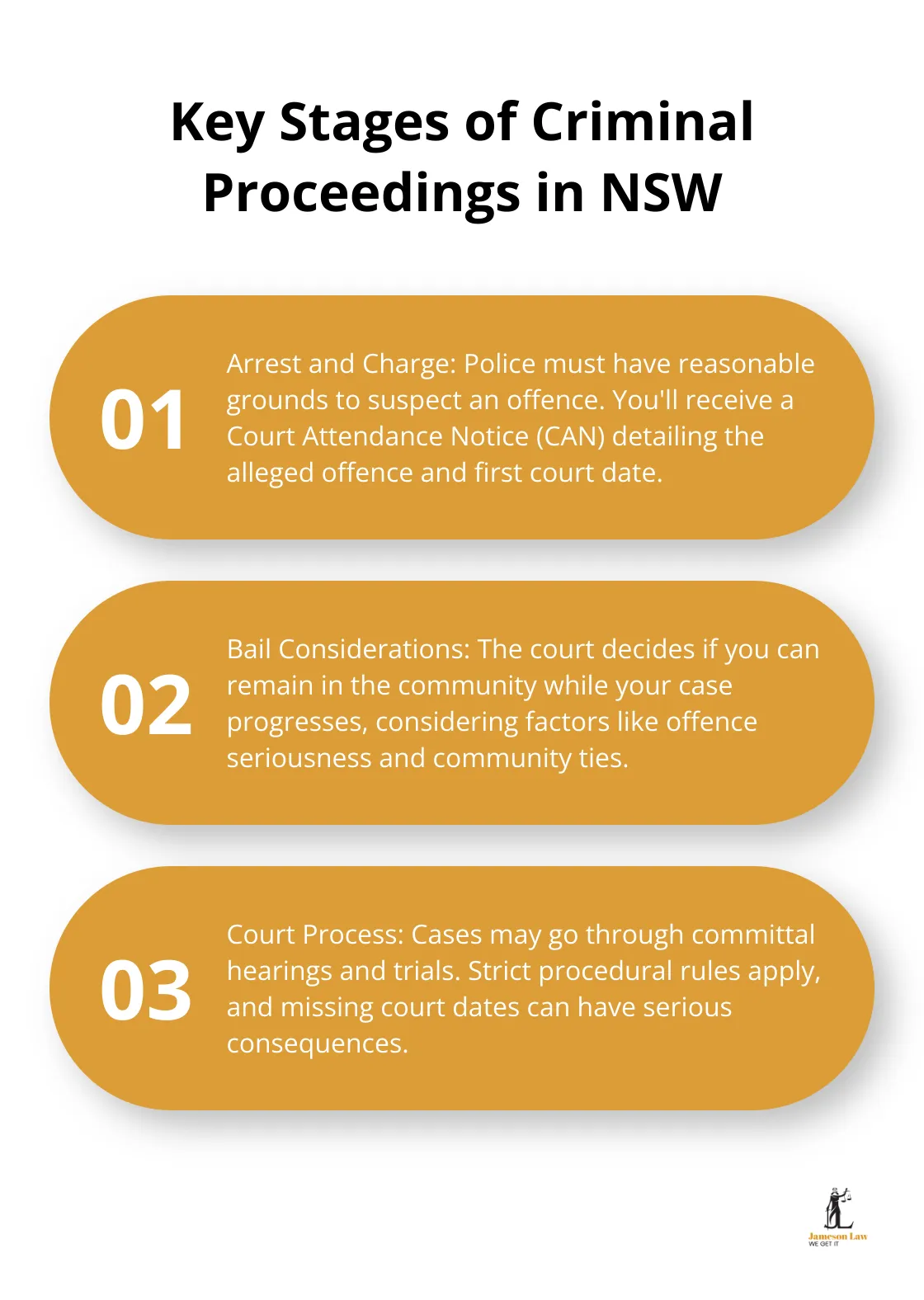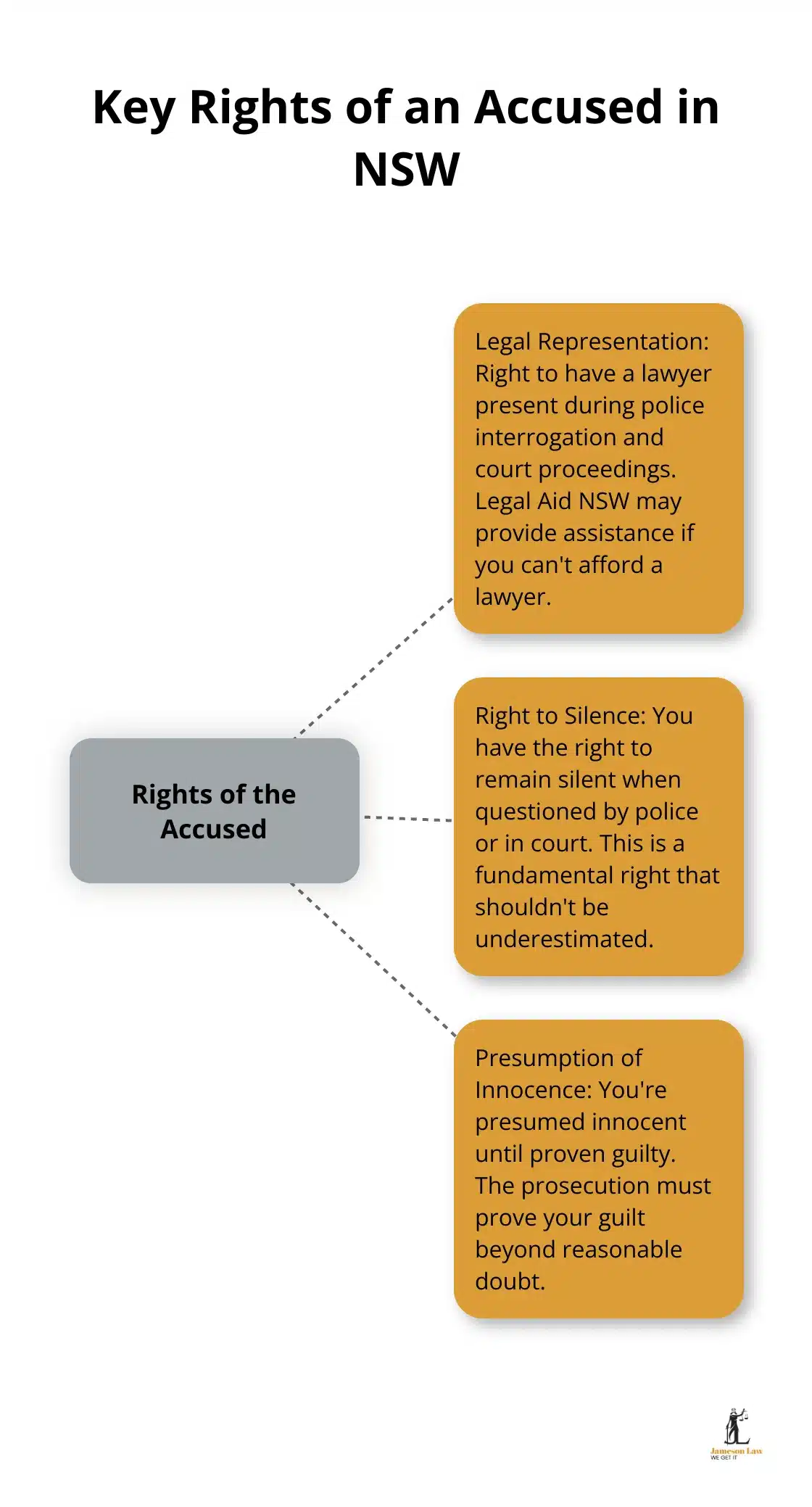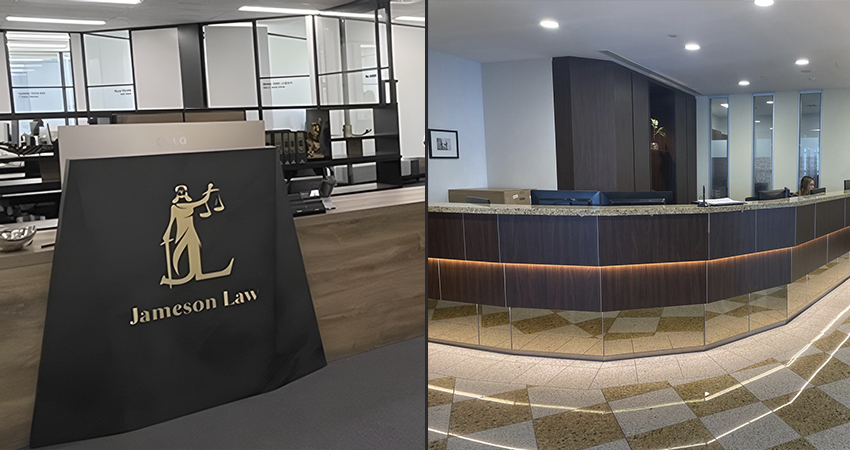Navigating the NSW criminal court system can be daunting for those unfamiliar with legal procedures.
At Jameson Law, we understand the complexities and challenges faced by individuals involved in criminal proceedings.
This guide aims to demystify the NSW criminal court process, outlining key stages, rights, and responsibilities to help you better understand what to expect.
How Does the NSW Criminal Court System Work?
Local Court: The First Stop for Most Cases
The Local Court handles most criminal and civil matters, including cases up to $100,000. It addresses summary offences and less serious indictable offences. Magistrates preside over these courts, which process about 96% of all criminal cases in NSW. Common matters include traffic offences, minor assaults, and drug possession. The Local Court tries to finalise 95% of summary criminal matters within 6 months (according to NSW Local Court statistics).

District Court: Handling More Serious Offences
The District Court deals with more serious criminal matters. It conducts trials for indictable offences, which are serious criminal offences that carry significant penalties and are heard in the higher courts. Judges preside over these courts, often with juries deciding on guilt.
Supreme Court: The Highest State Court
The Supreme Court addresses the most serious criminal matters, including murder and treason. It also hears appeals from lower courts. Despite its position at the top of the state court hierarchy, the Supreme Court often has shorter wait times for criminal matters compared to the District Court. This is due to the smaller number of cases it handles.
Specialised Courts: Addressing Specific Needs
NSW has several specialised courts to address specific types of offences or offenders. These include:
- The Drug Court: This court provides an alternative to imprisonment for drug-dependent offenders. It focuses on rehabilitation rather than punishment.
- The Children’s Court: This court deals with offences committed by individuals under 18. It emphasises rehabilitation and diversion from the criminal justice system.
Navigating the Court System
Understanding the structure and function of each court is essential for anyone facing criminal charges or interested in the legal process. Each court level has its own procedures, timelines, and potential outcomes.
Legal representation can significantly impact the outcome of a case at any court level. Experienced criminal lawyers can provide guidance through the complexities of the NSW court system, ensuring clients receive the best possible representation and outcomes.
The next chapter will explore the stages of criminal proceedings in NSW, from arrest to sentencing, to provide a comprehensive understanding of the legal journey one might face in the criminal justice system.
What Happens During Criminal Proceedings in NSW?
Arrest and Charge: The Initial Steps
Criminal proceedings in NSW start with an arrest. NSW Police must have reasonable grounds to suspect you’ve committed an offence. They will inform you of your rights, including the right to remain silent and seek legal advice. After arrest, police may question you at the station. It’s important to exercise your right to silence and contact a lawyer before answering any questions.
If charged, you’ll receive a Court Attendance Notice (CAN) detailing the alleged offence and your first court date. This is a critical time to seek legal representation.

Bail Considerations: Staying in the Community
Following charges, bail becomes a key consideration. Bail allows you to remain in the community while your case progresses. The court considers several factors when deciding bail, including the seriousness of the offence, your ties to the community, and any potential risks.
Recent statistics show that bail refusal rates have increased significantly over the past two decades. In 1995, Indigenous people accounted for 19 per cent of CAVO charges finalised in the Local Court of NSW.
Preparing Your Defence: Building Your Case
Once charged, the prosecution must provide a brief of evidence. This contains all the evidence they plan to use against you (including witness statements, CCTV footage, and forensic reports). Your lawyer will carefully review this brief to build your defence strategy.
The time between receiving the brief and your court date is important for case preparation. Use this time to gather any additional evidence or witnesses that support your case. The prosecution must prove your guilt beyond reasonable doubt – a high standard that skilled defence lawyers can challenge effectively.
The Court Process: From Committal to Trial
For more serious offences, a committal hearing may occur in the Local Court. This determines if there’s enough evidence for your case to proceed to trial in a higher court. Many cases are resolved at this stage through negotiations or by entering a plea.
If your case goes to trial, it will be heard in either the District or Supreme Court, depending on the severity of the charges. Trials can be before a judge alone or a jury. The choice between these options can significantly impact your case outcome, making it a critical decision to discuss with your lawyer.
Throughout the court process, strict procedural rules apply. Violating these rules or missing court dates can have serious consequences (including additional charges or unfavourable case outcomes).
Sentencing: Understanding the Outcomes
If found guilty or if you plead guilty, the court will determine your sentence. Sentencing in NSW has become notably tougher over the past two decades.
Factors considered in sentencing include the nature of the offence, your criminal history, personal circumstances, and any mitigating factors. Effective legal representation at this stage can make a substantial difference in the severity of your sentence.
As we move forward, it’s important to understand your rights and responsibilities throughout this process. The next section will outline these key aspects to help you navigate the criminal justice system more effectively.
What Are Your Rights and Duties as an Accused in NSW?
Right to Legal Representation
In NSW, you have the right to have a lawyer present during a police interrogation. If you can’t afford a lawyer, Legal Aid NSW may provide assistance, including representation in various criminal matters such as summary offences.
Power of Silence
You have the right to silence when questioned by police or in court. This right is fundamental and shouldn’t be underestimated. Anything you say can be used as evidence against you, so it’s often best to consult with a lawyer before making any statements.
Remaining silent during police interviews can have significant consequences on subsequent legal proceedings and trial outcomes. It’s crucial to understand this right and its implications.
Presumption of Innocence and Burden of Proof
In NSW, you’re presumed innocent until proven guilty. This means the prosecution must prove your guilt beyond reasonable doubt. You don’t have to prove your innocence.
However, this doesn’t mean you should take a passive approach to your defence. You should work actively with your lawyer to challenge evidence and present your side of the story.

Court Appearance Obligations
When accused of a crime in NSW, you have certain obligations. You must attend all scheduled court appearances. If you fail to appear, you may face additional charges and it may negatively impact your case.
You should dress appropriately for court appearances (this shows respect for the court and can positively influence how you’re perceived). Arrive early, be polite, and follow all court rules and procedures.
Consequences of Breaching Bail
If granted bail, you must strictly adhere to all conditions. Breaching bail conditions is a serious offence in NSW. It can result in immediate arrest, revocation of bail, and new criminal charges.
Final Thoughts
The NSW criminal court system presents a complex landscape for those facing charges. Each stage of the process, from arrest to sentencing, requires careful navigation and understanding. The structure of the courts, including Local, District, and Supreme Courts, determines how cases progress through the system.
Individuals must know their rights and responsibilities when involved in criminal proceedings. The right to legal representation, the power of silence, and the presumption of innocence form the foundation of a fair trial. However, these rights come with obligations such as attending court appearances and following bail conditions (if granted).
Professional legal advice can make a significant difference in the outcome of a case in the NSW criminal court. Jameson Law offers expert guidance through every stage of the criminal justice process. Our experienced team works to protect your rights and achieve the best possible outcome for your case.











